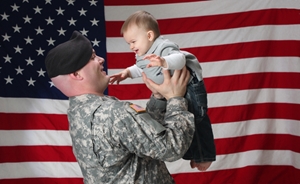Enlisting in the Armed Forces can be the most significant act a soldier does for his or her country, but it is most often life after service that poses more challenges for individual servicemembers. Civilian life offers markedly different opportunities and demands separate expectations from military service. After an extended deployment, reintegrating into a normal way of life proves difficult for many soldiers.
Reconnecting with family can be one of the most perilous transitions from active service to life after military. Depending on the length of a deployment, soldiers may return to a spouse that looks and acts different than before and a financial situation wholly changed from the one they left.
While these issues can be worked through with the help of another caring adult, a University of Wisconsin study suggests that children pose a singularly difficult issue for fathers returning from deployments. Although the researchers found that the men in the study expressed excitement and interest in learning and engaging with their children upon returning home, the pressures of their service caused troubles in reconnecting with their young and infant children.
Relearning parenting skills
Tova Walsh, a Robert Wood Johnson Foundation health and society scholar at the University of Wisconsin and lead author of the study published in a special issue of the journal Health and Social Work, interviewed 14 military fathers who were either preparing to return home or had just arrived back from an extended deployment. Most men were members of the Michigan Army National Guard, and all of them had children ages 6 and under.
Walsh and her colleagues found that the time the fathers spent in the military affected the expectations of both parents and children upon the fathers' return. For one returning soldier, he had been gone so long that his child did not recognize him.
"He (was) looking at me like, 'Who's that?' one father told Walsh as part of the study. "She had to tell him, 'That's Daddy.' I have no idea what our relationship would be like if there was no Iraq War."
Fathers who leave home for an extended period of time for military service may return to find already grown children with preconceptions of who their father might be.
"A service member who deploys when his child is an infant and returns home when the child is a toddler may find an entirely different child," Walsh said in a statement. "Under these circumstances, fathers find that it takes substantial effort to rebuild their relationship with their child."
The study also found that symptoms of post traumatic stress disorder among the soldiers complicated their transition to fathers during their life after service. The fathers – half of which were diagnosed with PTSD – reported growing irritated too quickly with their children's behaviors and an inability to control their tempers.
Walsh emphasized the need for more comprehensive reintegration services for returning soldiers, especially ones such as those in her study, who want to become better fathers but are at a loss as to how to do it.
Healing with children
The true tolls of PTSD are not completely known, but even less so are the secondary effects that the condition can have on those around one with the condition.
BrainLine Military explained that children can be highly susceptible to a parent with PTSD, even to the point they may develop symptoms that mirror those they see in their parents. Called secondary traumatization, the child of a military parent may exhibit behavioral issues caused by stress over the initial condition of his or her mother or father.
Families that observe a cycle of trauma should consider communicating with each other about their issues and possibly seek out professional help, BrainLine Military recommended. These resources may be available through veterans benefits.

